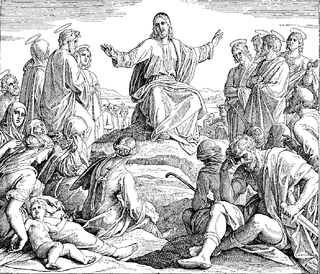Related Research Articles

The Golden Rule is the principle of treating others as one wants to be treated. Various expressions of this rule can be found in the tenets of most religions and creeds through the ages. It can be considered an ethic of reciprocity in some religions, although different religions treat it differently.
The First Commandment of the Ten Commandments may refer to:

Lashon hara is the halakhic term for speech about a person or persons that is negative or harmful to them, even though it is true. It is speech that damages the person(s) that are talked about either emotionally or financially, or lowers them in the estimation of others.
Computer ethics is a part of practical philosophy concerned with how computing professionals should make decisions regarding professional and social conduct.
Van Orden v. Perry, 545 U.S. 677 (2005), was a United States Supreme Court case involving whether a display of the Ten Commandments on a monument given to the government at the Texas State Capitol in Austin violated the Establishment Clause of the First Amendment.

The Ten Commandments, or the Decalogue, are a set of biblical principles relating to ethics and worship that play a fundamental role in Judaism and Christianity. The text of the Ten Commandments appears twice in the Hebrew Bible: at Exodus 20:2–17 and Deuteronomy 5:6–21.

Matthew 5:43 is the forty-third verse of the fifth chapter of the Gospel of Matthew in the New Testament and is part of the Sermon on the Mount. This verse is the opening of the final antithesis, that on the commandment to "Love thy neighbour as thyself".
The Great Commandment is a name used in the New Testament to describe the first of two commandments cited by Jesus in Matthew 22:35–40, Mark 12:28–34, and in answer to him in Luke 10:27a:
... and one of them, a lawyer, asked him a question to test him. "Teacher, which commandment in the law is the greatest?" He [Jesus] said to him, "'You shall love the Lord your God with all your heart, and with all your soul, and with all your mind.' This is the greatest and first commandment. Love God above all else. And the second is like it: 'You shall love your neighbor as yourself.' On these two commandments hang all the law and the prophets."
The Second Commandment refers to:
On June 19, 2007, the Vatican, under the direction of Pope Benedict XVI and Cardinal Renato Martino, issued a 36-page document entitled Guidelines for the Pastoral Care of the Road, created by the curial Pontifical Council for Migrants and Itinerant People, under the leadership of Renato Raffaele Cardinal Martino, and intended for bishop conferences around the world. The document specifically states that it is aimed at bishops, priests, religious and other pastoral workers in hopes of pastoral caregivers paying greater attention to expressions of human mobility. The document derived some of its material from the Old Testament, the New Testament, the American Automobile Association, and statements by Popes Pius XII, John XXIII, Paul VI and John Paul II.
Ethics or moral philosophy is a branch of philosophy that involves systematizing, defending, and recommending concepts of right and wrong conduct. The field of ethics, along with aesthetics, concern matters of value, and thus comprise the branch of philosophy called axiology.

Cyber ethics is the philosophic study of ethics pertaining to computers, encompassing user behavior and what computers are programmed to do, and how this affects individuals and society. For years, various governments have enacted regulations while organizations have defined policies about cyberethics.
Several alternatives to the Ten Commandments have been promulgated by different persons and groups, which intended to improve on the lists of laws known as the Ten Commandments that appear in the Bible. Lists of these kinds exist in many different cultures and times. They are sometimes given names – for example, the Hindu Yamas.

Charm School with Ricki Lake is the third and final season of the VH1 reality television series Charm School. Fourteen contestants from Rock of Love Bus with Bret Michaels and Real Chance of Love must change their old ways and learn improvement through acts of charity work. Ricki Lake is the headmistress of the Charm School, and is assisted by deans Alani "La La" Vazquez and Stryker. Ebony Jones (Risky) was ultimately named Charm School Queen and was awarded the $100,000.
Judaism offers a variety of views regarding the love of God, love among human beings, and love for non-human animals. Love is a central value in Jewish ethics and Jewish theology.

"Thou shalt not take the name of the LORD thy God in vain" is the second or third of God's Ten Commandments to man in Judaism and Christianity.

"Thou shalt not commit adultery" is found in the Book of Exodus of the Hebrew Bible. It is considered the sixth commandment by Roman Catholic and Lutheran authorities, but the seventh by Jewish and most Protestant authorities. What constitutes adultery is not plainly defined in this passage of the Bible, and has been the subject of debate within Judaism and Christianity. The word fornication means illicit sex, prostitution, idolatry and lawlessness.

Thou shalt not kill, You shall not murder or You shall not kill (KJV), is a moral imperative included as one of the Ten Commandments in the Torah. The Ten Commandments are given twice in the Torah, and this one appears at both Exodus 20:13 and Deuteronomy 5:17. Other passages in the Torah describe circumstances in which killing is permitted or encouraged. In Jewish law, a wrongful killing deserving punishment incurs what is known as bloodguilt.

"I am the LORD thy God" is the opening phrase of the Ten Commandments, which are widely understood as moral imperatives by ancient legal historians and Jewish and Christian biblical scholars.
Brotherly love in the biblical sense is an extension of the natural affection associated with near kin, toward the greater community of fellow believers, that goes beyond the mere duty in Leviticus 19:18 to "love thy neighbour as thyself", and shows itself as "unfeigned love" from a "pure heart", that extends an unconditional hand of friendship that loves when not loved back, that gives without getting, and ever looks for what is best in others.
References
- ↑ Leopold, Todd (April 9, 2013). "That Twitter account might not be who you think". CNN . Retrieved September 30, 2015.
- ↑ Barquin, Ramon C. (May 7, 1992). "In pursuit of 'Ten Commandments' for Computer Ethics". Computer Ethics Institute. Retrieved 2013-08-17.
- ↑ O'Reilly, Dennis (October 12, 2010). "The Internet and the death of ethics". CNET . Retrieved September 30, 2015.
- ↑ Kathy Fitzpatrick, Carolyn Bronstein (2006). Ethics in Public Relations: Responsible Advocacy. Sage Publications. p. 116. ISBN 1-4129-1798-0.
- ↑ Computer Ethics – Lecture 10
- ↑ CCSR:Commentary on the 'Ten Commandments for Computer Ethics' Archived 2012-07-22 at archive.today
- ↑ Official (ISC)2 Guide to the CISSP CBK. CRC Press. November 14, 2006. ISBN 9780849382314.
- ↑ "The Ten Commandments of Computer Ethics" (PDF). Retrieved 2012-05-22.